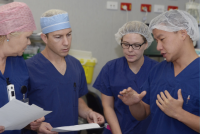The Safe Surgery NZ programme aims to improve perioperative care by encouraging teams to consistently apply evidence-based practices and safety checks to all patients, and by improving teamwork and communication.
 The quality and safety markers for the programme are:
The quality and safety markers for the programme are:
- observations: the number of observational audits carried out in each organisation– the target is 50 per quarter
- uptake: the count and percentage of observed operations where the checklist was completed – target 100 percent
- engagement – percentage of observed stages with engagement scores of 5, 6 or 7 (scale is 1–7) – target 95 percent for sign in, time out and sign out.
Useful resources:
- Actively listening for patient safety (video)
- Briefings and debriefings
- Communication tools
- Improving surgical teamwork and communication: A guide to preparing and implementing (August 2021)
- Safer surgery journal articles (long and short versions, updated August 2021)
- Speaking up for patient safety (video)
- Surgical briefing toolkit
Background
The programme rolled out surgical teamwork and communication interventions from 2015 to 2017. It was expected that private surgical hospitals worked with their local DHB to implement the interventions. Read more about the roll-out process.
The project tested the following evidence-based interventions and international approaches to reducing patient harm from surgery with public and private hospital surgical teams:
- surgical team briefings
- paperless surgical safety checklist
- debriefings
- supporting communication tools, such as ISBAR (identify, situation, background, assessment, recommendation) and closed loop feedback.
The proof-of-concept project reported an improvement in both the participants’ perception of their colleagues’ communication and collaboration skills, and on the overall culture of teamwork and communication from implementation of the recommended interventions. Theatre team members commented that the benefits of the proof of concept project included improved levels of teamwork, a more inclusive culture, improved communication and improved preparation for operations.
You can read more about the proof of concept project here, and in the project's final report.
